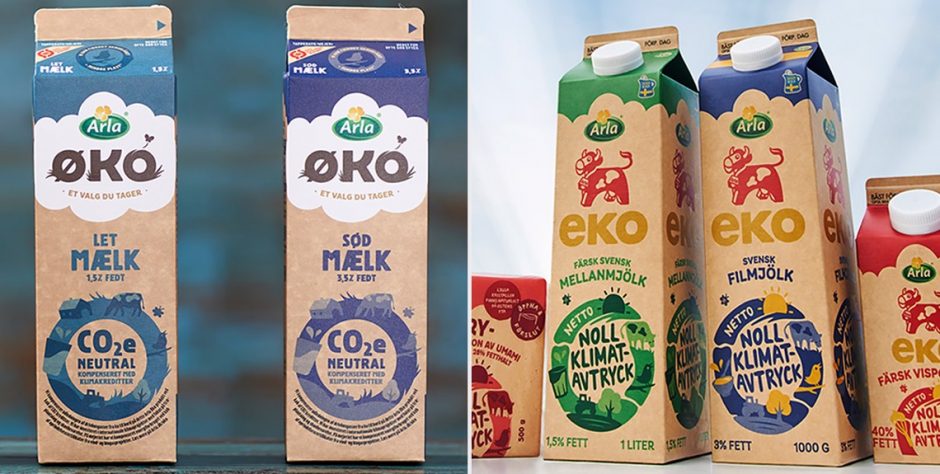Dairy co-op Arla is launching a new system which offers its farmer owners a better price for green energy generated on their farms.
The move is part of a series of initiatives by the co-op as it looks to increase the use of renewables in its operations and achieve net zero climate emissions by 2050.
Many of Arla’s farmers have branched out from milk production into biodiversity projects, providing manure for biogas, or generating green energy for their own farms and to sell to the public grid.
Until now, farmers have been selling their energy via utilities companies or traders, using Renewable Energy Guarantees of Origin (REGO), which are issued for renewable electricity produced on farms. Under the new system they will sell directly to Arla, cutting out third parties and giving farmers the full price the co-op would pay for REGOs on the market.
REGOs are a EU standardised instrument to guarantee that one MWH of electricity has been produced from renewable energy sources and that the carbon reductions is only counted once – by the owner of the GO.
Related: Co-op Group unveils ten-point plan to hit zero-carbon by 2040
The GO is issued to the producer of the energy and is a tradable commodity, which is often sold together with the green energy, for instance to a utilities company that typically resell them to companies who want to reduce their carbon footprint.
“Arla farmers can help their own company to accelerate the transition to renewable energy while the company can maximise the value of their investments in renewable energy,” said head of sustainability Hanne Søndergaard.
“This demonstrates how we in our co-operative’s micro food system can work together to increase the sustainability of our value chain to the benefit of our owners, our business and the environment.”
Generating circularity within the co-op’s own value chain is a move welcomed by Arla chair, Jan Toft Nørgaard.
“With this opportunity, the green energy that our owners produce can be counted as part of our collective actions to make dairy products more sustainable,” he said. “The full profit for the GOs that we are able to secure the farmers with this move has no extra cost for the cooperative and is a positive contribution to the business case for Arla farmers who consider investing in renewable energy.”
Arla says its climate emissions have been lowered 24% since 2015 and the share of renewable energy used in its operations is currently 35%. A continuous increase is part of the ambition to reduce total emission by 30% from 2015 to 2030 and to be carbon net zero in 2050.
Arla also recently unveiled data from its Climate Checks programme – which it describes as “one of the world’s largest externally validated set of climate data from seven European countries”.
According to the data, 24% its members produce renewable electricity from wind turbines and solar panels on their farms. It is mandatory for farmers in Germany and Luxembourg to pass over their GOs for the green electricity to the government if their electricity production is subsidised, so the share of owners who can choose to sell them to Arla is currently 14%. Arla estimates that around a fifth of the company’s total electricity usage in its operations can potentially be covered by farmer-produced GOs.
Related: Scottish farmers urged to share data through co-ops to boost productivity
It says the “unique data set” confirms that its farmers “are among the most climate efficient dairy farmers in the world” and offers “a clear blueprint of what will drive further reductions of greenhouse gas emissions”.
A total of 7,986 Arla farmer owners have assessed and submitted data to 203 questions about their herd, feed production, energy usage etc. The data, verified by an external climate advisor, confirms that Arla farmers are among the most climate-efficient dairy farmers in the world with 1.15 kg of CO2e per kilo of milk including peat lands.
Mr Nørgaard said : “We will use this to decarbonise our farms at a faster pace and share our findings with stakeholders to help drive an effective transition for the whole industry. There’s a huge amount of value in this for all of us.”
The data has revealed five universal levers to a lower carbon footprint for dairy on all types of Arla farms. They are:
- Better feed efficiency to improve milk yield
- Precision feeding to reduce surplus protein in feed rations
- A healthy and long life for the cow to improve milk yield
- Precise fertiliser management to reduce nitrogen surplus from feed production
- Better land use management to ensure better crop yields
The levers apply to all Arla farms in the UK, Sweden, Denmark, Germany, the Netherlands, Belgium and Luxembourg regardless of size, geography, breed or landscape conditions.
“The data shows that all types of farms can achieve tangible results if precision farming is increased in these five areas,” added Mr Nørgaard.
Arla farmers will now get access to a new digital tool that enables them to follow their own progression and to benchmark against data from other Arla farms. Insights from the compiled data will also be shared within the cooperative and presented to politicians, research partners and industry stakeholders to help the wider decarbonisation effort.

Other recent green initiatives from the co-op include a new bucket for its Skyr yoghurt, which it says is made with 40% less plastic and will ensure a 30% CO2 reduction; and the launch of carbon-neutral milk brands in Denmark and Sweden.